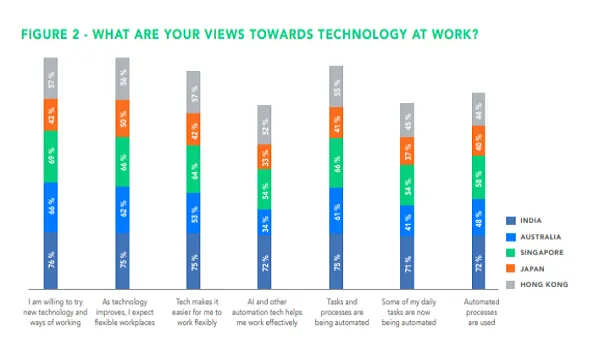
Singapore trails behind India in willingness to embrace workplace automation
However,more than half agreed that AI will boost job efficiency and productivity.
Close to 70% of Singaporeans said that they are willing to try new technologies and ways of working in order to be more efficient or productive, which is higher than the global average and just behind India at 76%, a study by Verint and Opinium Research LLC found.
Respondents also ranked using AI in the workplace to replace or augment manual labour, higher than their Australian counterparts (54% vs 34%). But this still falls behind India’s 72%.
“More than half of Singaporeans surveyed (54%) have daily tasks that have already been automated, which similarly is higher than Japan and Australia at 37% and 41%, respectively, but still behind India (71%),” the researchers noted. “It’s predicted this trend will continue in the future with 66% of Singaporean workers saying that they continue to see processes being automated. This is significantly higher than in Japan (41%) and Singapore appears to be catching up to India (75%).”
Also read: Here's why robots won't take your job
Interestingly, more than half or 54% of Singaporeans were observed to agree that AI and other automated technology does help to perform their job more effectively.
When compared to Australia, Hong Kong and Japan, Singaporeans are overall more comfortable with technology adoption not just in the workplace, but also as consumers, with one in two customers preferring digital or online methods for enquiries.
That said, a noticeable trend is that although Singaporeans are growing more comfortable interacting online with service providers, on occasions they still desire human interaction with 57% of survey respondents preferring to speak to someone in person or on the phone.
This is followed by their online account portal (26%) and their provider’s mobile app (17%), the researchers said, adding that some digital experiences will still need work given the hesitation around artificial intelligence (AI) solutions (1%), personal assistants (2%), video chat (2%) and in-store kiosks (3%).
This might be explained by customers not actually being aware of when they are being served by chat bots or AI-driven solutions. We know that these kinds of technologies are being implemented and being used by customers. Customers might just not know it at the time that they are engaging with such digital solutions,” they noted.
Also read: Singapore unveils AI governance framework
“Our study shows that Singapore is striding ahead in digital adoption and is carving out a digital future. This is visible by the way consumers interact with brands, opting for a digital customer service and in the way workers favourably view AI and robotic technologies in the workplace,” said Verint’s VP for Southeast Asia Manish Shah.
However, he noted that there is still progress to be made with some technologies proving to have slower uptake in the customer journey such as personal assistants, AI-driven customer technology and kiosks, especially when compared to India and even Hong Kong.
“So, to win the digital race, Singapore needs to continue to build and grow on the foundational blocks already set,” he said. “When servicing the customer, don’t be afraid to turn to AI-driven technologies like bots and virtual assistants. When done right, it can be a very powerful solution that will keep customers and employees happy.”



![SBR 5 Lorem Ipsum News 2 [8 May]](https://cmg-qa.s3.ap-southeast-1.amazonaws.com/s3fs-public/styles/exclusive_featured_article/public/2025-05/a_hand_pointing_to_a_futuristic_technology_5b87c9d0e3_3.png.webp?itok=M3Hf-9XR)
![SBR 4 Lorem Ipsum [8 May Top Stories]](https://cmg-qa.s3.ap-southeast-1.amazonaws.com/s3fs-public/styles/exclusive_featured_article/public/2025-05/a_hand_pointing_to_a_futuristic_technology_5b87c9d0e3_2.png.webp?itok=2m5Wl0MX)


![Exclusive three SBR 12 Lorem Ipsum [8 May]](https://cmg-qa.s3.ap-southeast-1.amazonaws.com/s3fs-public/styles/exclusive_featured_article/public/2025-05/a_hand_pointing_to_a_futuristic_technology_5b87c9d0e3_11.png.webp?itok=8kn_UIfA)
![SBR 3 Lorem Ipsum [ Exclusive 2]](https://cmg-qa.s3.ap-southeast-1.amazonaws.com/s3fs-public/styles/exclusive_featured_article/public/2025-05/a_hand_pointing_to_a_futuristic_technology_5b87c9d0e3_1.png.webp?itok=YCyjLegJ)
![SBR 2 Lorem Ipsum [8 May]](https://cmg-qa.s3.ap-southeast-1.amazonaws.com/s3fs-public/styles/exclusive_featured_article/public/2025-05/a_hand_pointing_to_a_futuristic_technology_5b87c9d0e3_0.png.webp?itok=_cKD-29o)

![Video [Event News]](https://cmg-qa.s3.ap-southeast-1.amazonaws.com/s3fs-public/styles/event_news_featured_article/public/2025-05/screenshot-2025-05-08-at-4.58.53-pm_0.png.webp?itok=Kud35sMs)
![Event News SBR 9 Lorem Ipsum [8 may]](https://cmg-qa.s3.ap-southeast-1.amazonaws.com/s3fs-public/styles/event_news_thumbnail/public/2025-05/a_hand_pointing_to_a_futuristic_technology_5b87c9d0e3_8.png.webp?itok=DTh_dbYp)
![Event News SBR 9 Lorem Ipsum [8 May]](https://cmg-qa.s3.ap-southeast-1.amazonaws.com/s3fs-public/styles/event_news_thumbnail/public/2025-05/a_hand_pointing_to_a_futuristic_technology_5b87c9d0e3_7.png.webp?itok=vzDAzb6V)
![Event News SBR 8 Lorem Ipsum [8 May]](https://cmg-qa.s3.ap-southeast-1.amazonaws.com/s3fs-public/styles/event_news_thumbnail/public/2025-05/a_hand_pointing_to_a_futuristic_technology_5b87c9d0e3_6.png.webp?itok=jvHFc4P6)
![Video [Event News]](https://cmg-qa.s3.ap-southeast-1.amazonaws.com/s3fs-public/styles/video_thumbnail/public/2025-05/screenshot-2025-05-08-at-4.58.53-pm_0.png.webp?itok=yZnI0YBb)
![Video 1 SBR [8 May]](https://cmg-qa.s3.ap-southeast-1.amazonaws.com/s3fs-public/styles/video_thumbnail/public/2025-05/screenshot-2025-05-08-at-4.58.53-pm.png.webp?itok=9AAeRz_k)

 Advertise
Advertise

